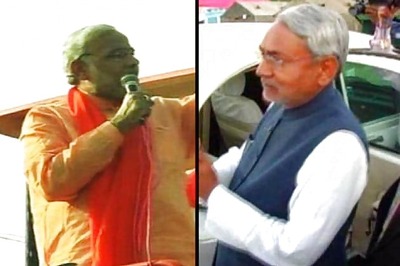
views
Ganesh Chaturthi is just a month away and there’s already talk of pollution, clay idols and what not. But what do the artisans themselves think? A quick check has revealed two facts. One, this time, there could be some sort of shortage of idols compared to the last few years. Second, we are nowhere near a green Ganesh festival.
Around this time of the year, the Miyapur stretch is usually be dotted with idol makers and their make-shift tents. Now, though, there aren’t quite as many.
Reason: Many of the workers and artisans involved in the production of the idols have reportedly moved out of State. Some of the artisans working on the stretch told City Express that the number of idols could come down in the city this time because of the shortage of manpower.
What prompted the workers to move out? “The ongoing metro rail works uprooted many of the roadside workers. The authorities have taken away most of the open land and roadsides,” said several artisans in one voice.
“For many years, there were more than 80 different groups, small and large, who were involved in Ganesh idol-making at Miyapur. This year, we are only around 15 groups here and a lot of us are using rented lands. Most of them have gone back to their villages. A few have shifted to other parts of the city,” said Praveen Bhatti who has been in the business for more than 16 years at Miyapur.
When asked about the reason, he replied, “the ongoing metro rail works which widened the roads near Miyapur have forced us out of the regular lands beside the roads.” According to Bhatti and his friends, the authorities have directed all the workers and artisans to vacate government lands.
Clay Ganesh?
Mission Impossible
“Every year, the demand for green Ganesh idols is increasing. To make idols completely with mud is near impossible. Mud cannot retain the shape. Once it is dry, cracks appear and it will break,” explained Narsiram, an idol maker near Miyapur who has been in the business for over 40 years.
“Unlike last year when we used around 50% plaster of paris, we have used only around 15-20% this year. Even though we keep our idols inside sealed sheds to protect them from rains, the moisture and cold weather may make the idols soft and damp, which is a big risk,” he pointed out.
In what could be music to the environmentalists’ ears, he said, “idols made of PoP take over 24 hours to dissolve in water whereas the ones we use right now take not more than five hours.” At the same time, it is a cause of concern because of the weather.
Another idol maker, Mansilal who hails from Jaipur but has been in Hyderabad for a very long time, said business orders are usually received a month ahead of the festival. “This is like gambling. We borrow money from lenders. Small profits also will not help as a lot of our revenue goes into paying back the loan with interest. Sometimes we cannot sell all the idols,” he said.
Chemical dyes still most preferred
These idol makers wish to use water colours and natural colours for their Ganeshas but the more profitable ones seem to be those coloured with chemicals. “People usually ask for the ones painted with chemicals. They are glossy and attractive. But we use water colours in 90% of our idols and the rest are special orders,” said Mansilal.




















Comments
0 comment